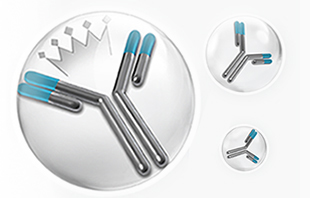Order a Crown Antibody (400 µl), get a Crown Antibody EV (80 µl) - FREE!
 |
|
 |
Abgent antibodies labeled with a "Crown" meet stringent requirements in terms of specificity, sensitivity, and reproducibility.
Now through June 30, 2014, |
|
|
Visit www.abgent.com and place your order online on any full size (400 µl) Crown Antibody. Add any evaluation size (80 µl, Cat# ending with an "-ev") Crown Antibody to the shopping cart. Enter code: Crown2014 before checkout. |
|
|
You may also place orders via email to orders@abgent.com or fax to 858-622-0609. Please mention promo code: Crown2014 when placing the order.  |
* This promotion applies only to Crown Antibodies listed on the Abgent website. The promotion is valid from April 15th to June 30th, 2014. Abgent reserves the right to cancel or modify this offer at any time. The promotion applies only to direct customers in the United States. The evaluation size Crown Antibody must be selected at time of order and will ship together with the full size Crown Antibody. Promo code "Crown2014" must be given at time of order. Discount not given for previously placed orders. This promotion cannot be combined with any other offers and is void where prohibited.














 Foundational characteristics of cancer include proliferation, angiogenesis, migration, evasion of apoptosis, and cellular immortality. Find key markers for these cellular processes and antibodies to detect them.
Foundational characteristics of cancer include proliferation, angiogenesis, migration, evasion of apoptosis, and cellular immortality. Find key markers for these cellular processes and antibodies to detect them. The SUMOplot™ Analysis Program predicts and scores sumoylation sites in your protein. SUMOylation is a post-translational modification involved in various cellular processes, such as nuclear-cytosolic transport, transcriptional regulation, apoptosis, protein stability, response to stress, and progression through the cell cycle.
The SUMOplot™ Analysis Program predicts and scores sumoylation sites in your protein. SUMOylation is a post-translational modification involved in various cellular processes, such as nuclear-cytosolic transport, transcriptional regulation, apoptosis, protein stability, response to stress, and progression through the cell cycle. The Autophagy Receptor Motif Plotter predicts and scores autophagy receptor binding sites in your protein. Identifying proteins connected to this pathway is critical to understanding the role of autophagy in physiological as well as pathological processes such as development, differentiation, neurodegenerative diseases, stress, infection, and cancer.
The Autophagy Receptor Motif Plotter predicts and scores autophagy receptor binding sites in your protein. Identifying proteins connected to this pathway is critical to understanding the role of autophagy in physiological as well as pathological processes such as development, differentiation, neurodegenerative diseases, stress, infection, and cancer.